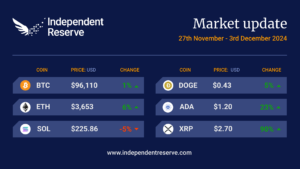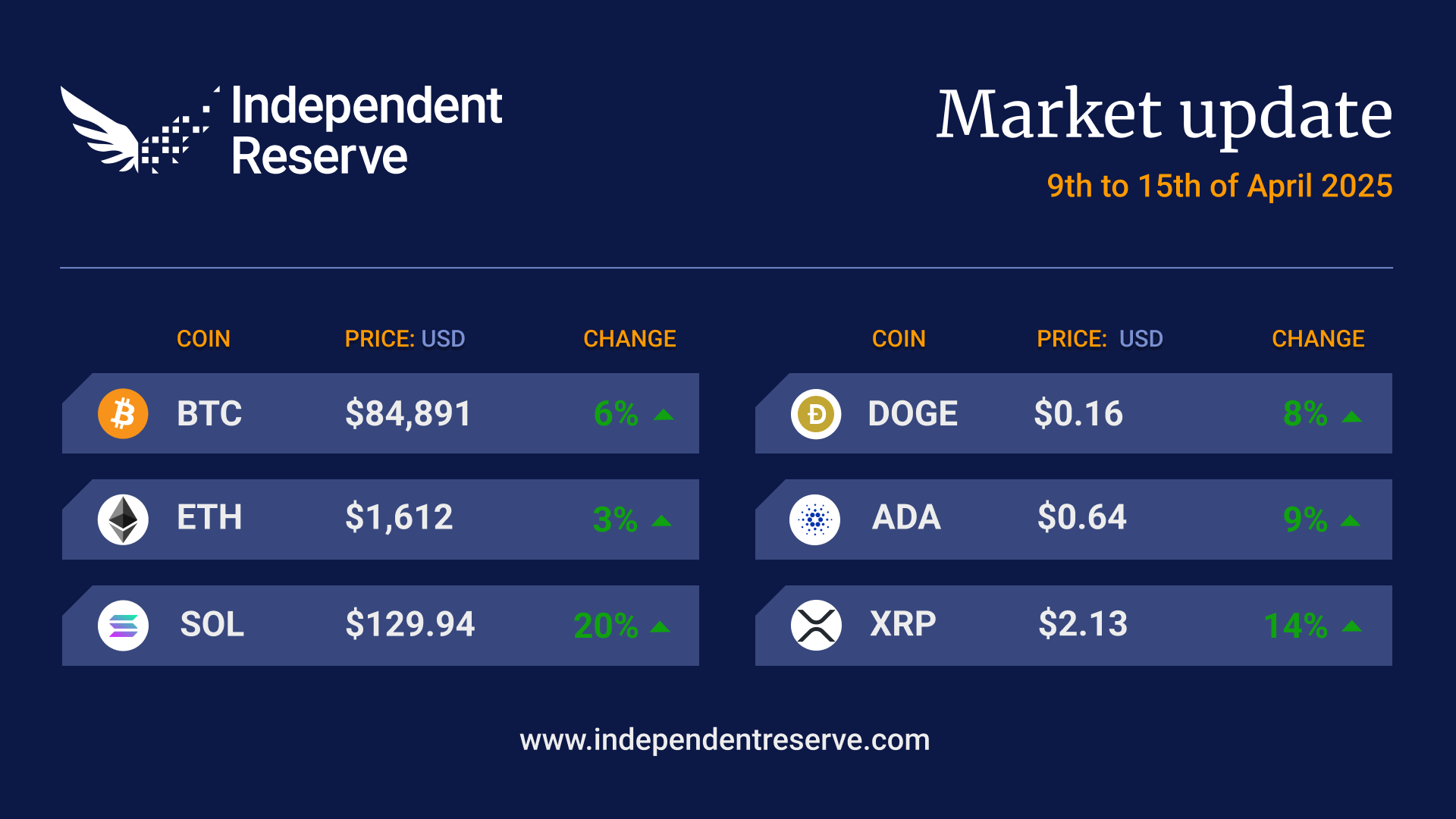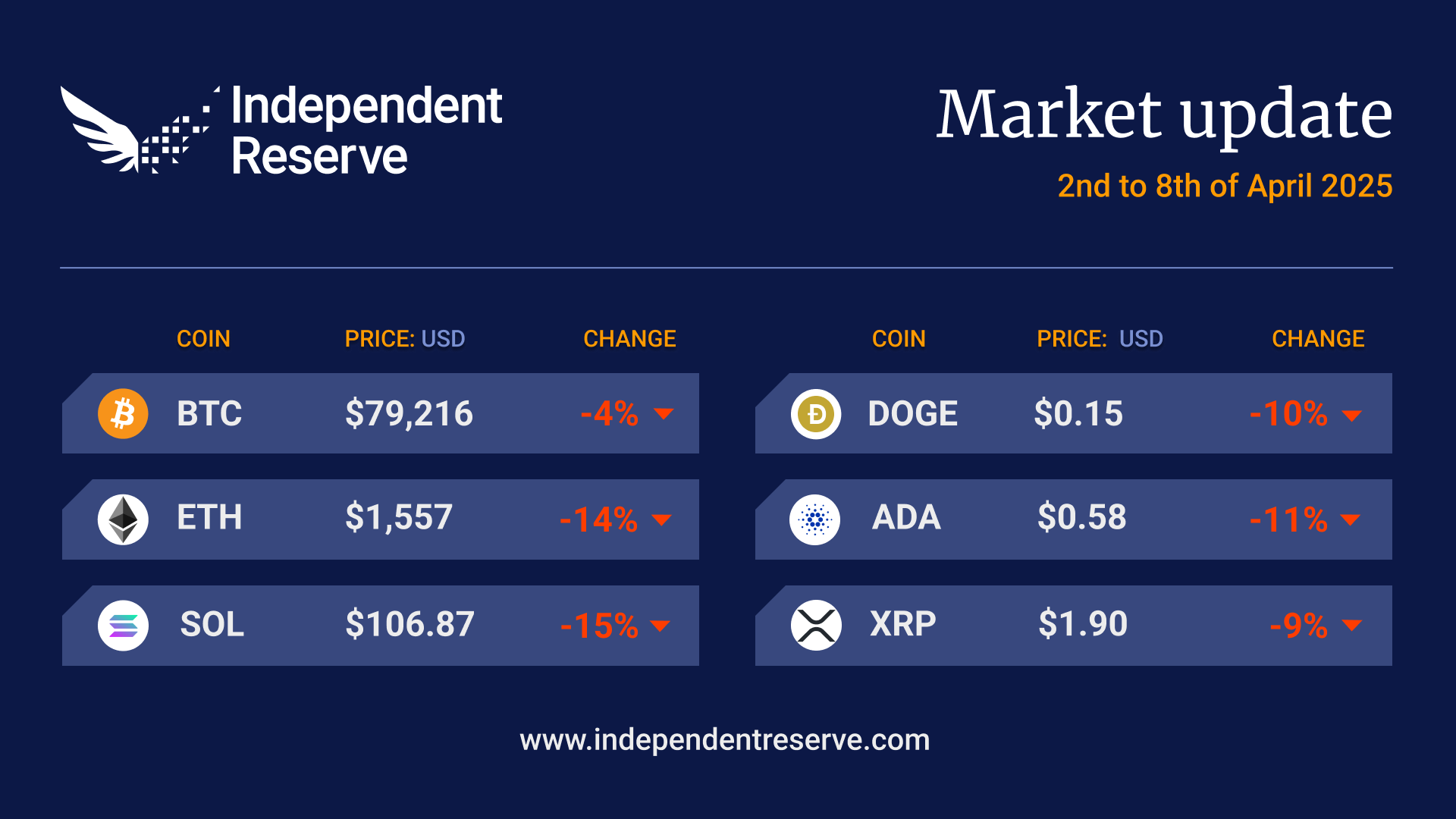In Markets
Bitcoin has just seen the biggest monthly candle in USD terms in history (A$40K/US$26K), with the price increasing 37% in November after the election. While there are some headwinds (the US government has just transferred A$1.45B/US$963M in seized Bitcoin (possibly to sell or possibly for custody), that amount pales in comparison to the A$9.9B/US$6.4B inflows into the Bitcoin ETFs in November. Bitcoin is currently up 1% for the week to trade around A$147,702 (US$96,110), while Ethereum gained 6% to trade around A$5,643 (US$3,653). XRP is back at 2018 prices, rewarding the faithful with another astonishing 90% gain this week. Solana fell 5%, with XRP overtaking it in market cap. Dogecoin gained 5%, Cardano rose 23%, and Shiba Inu increased 16%. The Crypto Fear and Greed Index is at 80, or Extreme Greed.

From the IR OTC Desk
This week, Bitcoin continues to solidify its US$90k – US$ 100k channel. Looking back, we were stuck in the $54k – $74k channel for 9 months, but we certainly don’t think there is a high probability of that repeating here. At the moment all eyes are firmly on the (older) alt coins. Their rise has surprised many, but there’s no such thing as an irrational market, so we follow with great interest (more on this below).
This crypto surge, often referred to as the ‘Trump Bump’ following the U.S. presidential election, has led to significant profits for investors, who seem to be channelling their gains into luxury purchases. However, market analysts caution that upcoming economic indicators, particularly U.S. labour market data, could influence Federal Reserve policies and, consequently, impact both traditional and crypto markets.
In the United States, the S&P 500 index disagrees and reached a record high, closing at 6,053 points, driven by strong performances in consumer discretionary, industrials, and financial sectors.
In Australia, robust consumer spending in November has diminished the likelihood of imminent interest rate reductions by the Reserve Bank of Australia, as the economy shows signs of resilience. The futures market continues to expect the cash rate to stay steady until 2025.
In Headlines
It’s altseason
Bitcoin dominance has fallen to 54.9%, below its two-year support line, and analyst Mikybull Crypto says that means the market is “officially in altseason.” A long-standing theory about crypto market capital flows suggests that Bitcoin rises first, the profits then flow into large-cap altcoins like Ethereum, and then everything else. But back in the day, everything was paired with BTC. CryptoQuant CEO Ki Young Ju points out that stablecoin liquidity (at an all-time high of US$186 billion/A$287B) is now the dominant factor. “The surge in altcoin trading volume isn’t driven by BTC pairs but by stablecoin and fiat pairs, reflecting real market growth rather than asset rotation,” he said. Utility-based altcoins have been pumping, with XRP’s little sister token Stellar gaining 474% in 30 days while Algorand is up 339%.
XRP hodlers are getting rich
Retail is back and bidding up XRP, reportedly after a surge of interest in TikTok. The 2013-launched cryptocurrency has surged an incredible 428% over the past 30 days, overtaking Solana and Tether to hit the number 3 spot by market cap. The big catalyst appears to be the end of regulatory pressure from the SEC, with a settlement in the securities case against it, which is rumoured to happen shortly. There’s also a new XRP ETF filing from WisdomTree, joining earlier filings from Bitwise, 21Shares and Canary. Ripple CEO Brad Garlinghouse also announced the company will invest in the existing, newly rebranded Bitwise Physical XRP ETP. There’s also fake news circulating that “every bank in Japan has plans to adopt XRP by 2025“, and that Ripple is investing in SWIFT, neither of which appears to be true. However, Fox Business reports that New York is likely to approve Ripple’s RLUSD stablecoin this week. It’ll be issued on the XRP Ledger and paired with XRP. ChainLinkGod, a prominent figure from the Chainlink (LINK) community, argues, however, that the stablecoin undermines the case for XRP: “There is simply no need for a ‘bridge currency’ in a world of stablecoins and CBDCs, hence the pivot to other products like RLUSD, custody, and CBDC platform that don’t use XRP.”
Ethereum slowly waking up
Four years from the genesis of the beacon chain on Dec 1 2020, Ethereum finally seems to be stirring from its long slumber, gaining 45% in the past month. That’s more than its chief rivals, Bitcoin (38%) and Solana (34%), albeit after a very long period of underperforming both. The Ethereum ETFs have seen US$549 million (A$847.5M) inflows over five positive days in a row, and the ETH ETFs flipped the Bitcoin ETFs on November 29, taking in US$332.9 million (A$514M) and outpacing the Bitcoin ETFs’ US$320M (A$494M) inflow. Analysts at Bernstein have released a report suggesting ETH’s strong fundamentals mean the risk/reward ratio for investors is now attractive, and they predict the new crypto-friendly SEC will approve staking yield for the Ether ETFs, driving a resurgence of interest.
Microsoft’s Bitcoin strategy
MicroStrategy’s Michael Saylor has given a three-minute video presentation to the Microsoft board, pitching the benefits of buying Bitcoin rather than tipping money into stock buybacks or holding bonds. “You’ve surrendered hundreds of billions of dollars of capital over the past five years, and you’ve just amplified the risks that your own shareholders face,” Saylor told them. “If you want to escape that vicious cycle, you’re going to need an asset without counterparty risk.” He claimed Microsoft could increase the stock price by US$584 (A$901) per share and add US$4.9 trillion (A$7.56T) to its value by 2034. Meanwhile, MicroStrategy announced that it had bought another 15,400 BTC between Nov. 25 and Dec. 1.
Tornado Cash sanctions thrown out
A US federal appeals court has disallowed the US Treasury Department’s sanctions on coin mixing service Tornado Cash. In a major victory for the industry, the judge found that immutable smart contracts could not be sanctioned. “Tornado Cash’s immutable smart contracts (the lines of privacy-enabling software code) are not the ‘property’ of a foreign national or entity,” the ruling said, meaning they can’t be blocked and the Treasury’s Office of Foreign Assets Control (OFAC) had “overstepped its congressionally defined authority” when it did so. OFAC sanctioned the mixer last year, stating that North Korean hackers were using it to launder coins. However, the sanctions were unable to shut it down.
Hong Kong plans tax breaks on crypto gains to bolster wealth hub appeal
Hong Kong plans to waive taxes on investment gains from cryptocurrencies and alternative assets for hedge funds, private equity, and family offices, aiming to strengthen its position as a wealth management hub. A proposal from the Financial Services and the Treasury Bureau includes extending capital gains tax exemptions to assets like virtual assets, carbon credits, and overseas properties. As Asia’s largest hedge fund hub, Hong Kong seeks to attract capital amid global tensions and rising cryptocurrency interest. The city hosts over 2,700 single-family offices, many managing over $50 million in assets. The exemptions may also cover pension and endowment funds, fostering a favourable environment for the industry.
Until next week, happy trading!


